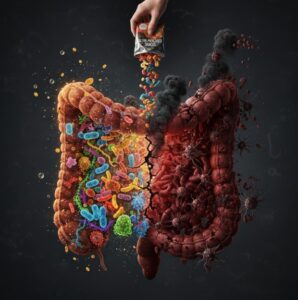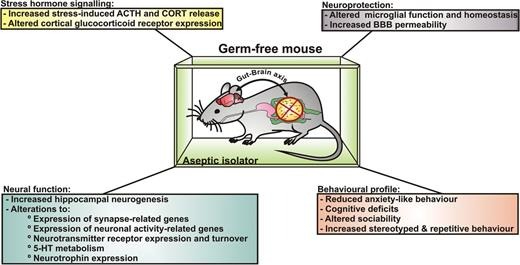Ultra-processed foods are everywhere: snacks, beverages, packaged meals, and while they’re convenient, they silently damage your body from the inside. The biggest victim is your gut microbiome, the invisible ecosystem that controls digestion, immunity, metabolism, and mood.
Ultra-processed foods are strongly linked to inflammation, anxiety, digestive disorders, weight gain, and weakened immunity, and all of these outcomes have one root cause: damage to the gut microbiome.
Below is a detailed, science-backed explanation of how ultra-processed foods disrupt your gut ecosystem and why it matters for your overall health.
The Invisible Battlefield of Microorganisms in our Gut
Right now, more than 20,000 species of bacteria coexist in your gut. They are not just passive residents; they synthesize vitamins, regulate immune cells, control inflammation, and even produce up to 90% of your serotonin, the neurotransmitter responsible for mood stability.
This is why many people with anxiety and depression often suffer from gut disorders, as they share the same biological root.
But do you know how ultra-processed foods destroy this delicate ecosystem? The issue goes far beyond simply killing beneficial bacteria. What follows is a chain reaction, a cascading collapse of the entire gut environment.
The Death of Microbial Diversity

According to a 2019 study from the University of Alberta in Canada, people who consume large amounts of ultra-processed foods have about 40% lower gut microbial diversity compared to those who eat natural, whole foods. Low diversity means the gut ecosystem has become fragile.
Imagine a forest made up of only one or two types of trees; it collapses easily when pests strike. The gut works the same way. Food additives selectively attack beneficial bacteria such as Lactobacillus and Bifidobacterium. Meanwhile, opportunistic bacteria like Clostridium and E. coli have strong resistance to chemical substances.
A research team at George Washington University reported that in mice fed artificial sweeteners for eight weeks, beneficial bacteria decreased by 25–45%, while harmful bacteria increased by 15–30%. Once this balance collapses and harmful bacteria take control, they produce toxins such as ammonia and hydrogen sulfide. These toxins irritate the gut lining and trigger inflammation.
The Collapsing Gut Barrier
The gut barrier is a single-cell-thick membrane, an extremely thin but critical frontline that protects us from the outside world. These cells are tightly connected by protein structures called tight junctions.
A 2016 Cornell University study found that when mice were given carboxymethylcellulose (CMC), a thickener used as a moisture-retention agent in bread and a stabilizer in ice cream, for 14 days, the gaps between their gut barrier cells widened by 2–3 times. As these spaces open, microscopic food particles, bacterial endotoxins, and harmful bacteria slip into the bloodstream. This is what we call leaky gut syndrome.
The immune system identifies these intruders as threats, triggering widespread inflammation throughout the body. Over time, repeated exposure can lead to the development of autoimmune diseases.
When the Conversation Between the Brain and the Gut Breaks Down

A 2018 study from University College Cork in Ireland revealed striking results. Germ-free mice—mice raised without any gut microbiota showed three times higher anxiety levels and twice as many depressive behaviors compared to normal mice. When their gut microbiota was restored, their behaviors returned to normal.
About 90% of serotonin and 50% of dopamine are produced in the gut. When food additives destroy gut microbes, serotonin production drops. This is why 60% of patients with irritable bowel syndrome (IBS) also suffer from depression or anxiety disorders.
Why Some People Gain Weight Even When Eating the Same Food
Obese individuals and people with normal weight have clearly different gut microbiome compositions. In a 2006 study by Professor Jeffrey Gordon at Washington University, when gut microbes from obese mice were transplanted into germ-free mice, the germ-free mice experienced a 47% increase in body fat even though they ate a normal diet.
Artificial sweeteners disrupt the microbes that metabolize sugar, ironically causing glucose intolerance. People drink diet beverages to lose weight, yet paradoxically, their risk of diabetes increases.
The Training Ground of the Immune System Collapses
The gut is the body’s largest immune organ, housing 70% of all immune cells. Gut microbes train these immune cells through constant interaction with diverse microorganisms, and the immune system learns what is dangerous and what is harmless.
A study from the University of Gothenburg in Sweden compared children raised on dairy farms with those raised in typical households. The children who grew up on farms had significantly lower rates of allergies. Their immune systems were “trained” through exposure to soil, animals, and the natural environment.
When children grow up in overly sterile environments, their immune systems develop without real-world training. They become overly reactive to harmless substances, yet sometimes fail to respond properly to actual threats. This is the essence of the hygiene hypothesis.
Recovery Is Possible, but…

Fortunately, the gut microbiome can recover. A 2020 Stanford University study found that participants who shifted to a fermented-food focused diet saw a 32% increase in microbial diversity in just 10 weeks.
However, a gut ecosystem that has been damaged for decades by ultra-processed foods recovers much more slowly. Some beneficial species disappear entirely, making restoration difficult through diet alone.
The more serious issue is intergenerational transmission. A mother’s gut microbiome is passed to her baby at birth. If the mother’s gut environment is poor, the child inherits a vulnerable microbiome from the very beginning, starting a cycle of decline.
Conclusion: Your Gut Depends on Your Choices
The 20,000 species living in your gut respond instantly to what you eat. Ultra-processed foods weaken microbial diversity, damage the gut barrier, disrupt the brain-gut connection, impair immunity, and alter metabolism.
Every meal you choose either nourishes these microbes or destroys them.
Your gut ecosystem is fragile, but recovery is possible. Protecting it begins with your daily diet.









